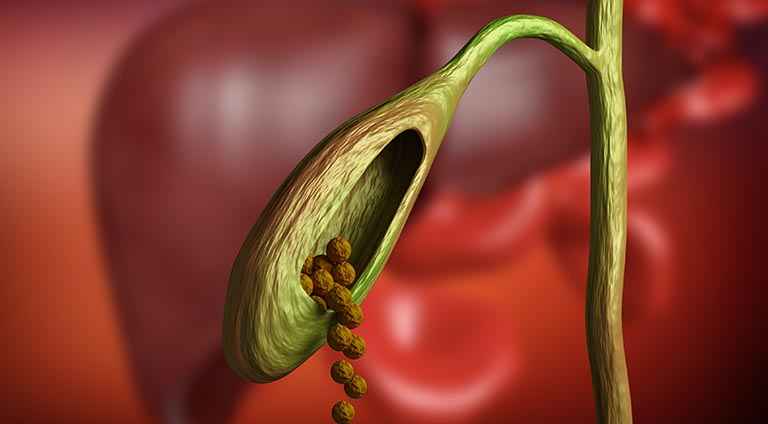When there is a bile imbalance in the gallbladder, patients suffer from gallbladder stones. It is essential to understand that not all gallstones require surgery. Sometimes, there may be no symptoms at all. From a size of a tiny grain to a golf ball, gallstones vary in size. They can be painful and cause blockage in a duct. In such situations, your surgical gastroenterologist may suggest a gallbladder removal surgery.
Gallbladder stones are one of the most common digestive problems. And so, a majority of the Indian population ignores them. Remember, complications from gallstones can cause grave issues. There are chances that the gallbladder stones cause severe blockage and move to other parts of the digestive system.
Let’s understand what complications can arise from gallbladder stones:
- ACUTE CHOLECYSTITIS
Also called inflammation of the gallbladder, acute cholecystitis occurs when gallstones or bile build-up inside the gallbladder cause blockage of the cystic duct.
Acute cholecystitis can cause pain in the upper right quadrant of the abdomen and last for several hours. Chills, high fever, rapid heart rate, nausea, and vomiting are also a few symptoms. Additionally, few patients may develop jaundice.
If acute cholecystitis is not treated, the patient may end up having pus inside gallbladder (pyocele). This can lead to gallbladder rupture, causing leakage of pus and bile inside the patient’s abdomen. It is a critical condition that requires prompt surgery and intensive care treatment. The gastrointestinal surgeon may suggest antibiotics and perform laparoscopic surgery to remove the gallbladder.
- JAUNDICE
If gallstones move out of the gallbladder and into the bile duct, the liver may not function optimally. The flow of bile may be affected and cause jaundice in a few patients. Jaundice can also occur due to inflammation of the gallbladder and gallbladder cancer.
Patients with jaundice have yellowing of the skin and eyes, abdominal cramps, dark urine, itching, fever, chills, and other flu-like symptoms, etc.
Usually, there is no surgery for jaundice caused by acute viral hepatitis. As the liver begins to cure itself, jaundice will go away. However, when the blockage in the bile duct is causing jaundice, the surgeon may suggest surgery to remove the blockage.
- ACUTE CHOLANGITIS
Bacterial infection of the biliary tract due to obstruction is called acute cholangitis. It occurs when gallstones or build-ups in the gallbladder cause a blockage, thus leading to bacterial infection. It can cause pain in the upper abdomen that moves towards the shoulder blade and makes the entire experience intolerable. High fever, chills, jaundice, itchy skin, and fatigue are other symptoms of acute cholangitis.
When a patient is suffering from the blockage of the bile duct, the surgical gastroenterologist may have to conduct an endoscopic retrograde cholangio-pancreatography (ERCP) to drain the bile and remove the infection. Additionally, he may prescribe antibiotics to treat the condition.
- ACUTE PANCREATITIS
One of the complications related to gallbladder stones includes acute pancreatitis. When a gallstone moves out of the gallbladder and reaches the duct of the pancreas, it can cause inflammation and infection.
If a patient is suffering from acute pancreatitis, he will experience symptoms such as dull pain in the central region of the upper abdomen. It will steadily worsen until it makes the patient starts feeling constant ache. Other symptoms include the general feeling of being sick, nausea, vomiting, diarrhea, loss of appetite, tenderness of the abdomen, high fever and, jaundice (less common).
Often acute pancreatitis clears up in 10-15 days. However, a few patients may require hospitalization to treat acute pancreatitis. Usually, doctors put the patient on a drip for avoiding severe dehydration and help him regain the lost minerals and fluids. The doctors will also prescribe painkillers to alleviate the pain.
- GALLBLADDER CANCER
It is a rare complication caused due to gallbladder stones. But we need to address gallbladder cancer because it is a grave issue. A recurring history of gallstones can lead to cancer of the gallbladder among a small number of patients.
If you have had gallbladder stones in the past and your family history includes gallbladder cancer, experts recommend visiting your surgical gastroenterologist and discussing your possible treatment options.
People often confuse the symptoms of gallbladder cancer with those of gallstones because they are very similar. Stomach ache, high fever, jaundice, nausea, and vomiting are all signs of gallbladder cancer. So, it is essential to pay attention to all the symptoms and get immediate medical attention.
- GALLSTONE ILEUS
Gallstone ileus is a type of bowel obstruction due to gallbladder stones. It is rare and affects only about 0.5% of patients with gallstones. The symptoms of gallstones ileus include abdominal ache, abdominal distension, constipation, nausea, vomiting, etc.
When inflammation or infection from the gallbladder causes a fistula (abnormal connection), it allows the gallstone to travel to the ileum (the third part of the small intestine). The distal end of the small intestine connects with the large intestine and helps with digestion. When a gallstone lodges itself in the ileum, it can block bowel movement that requires immediate medical treatment.
DO NOT IGNORE GALLSTONES; AVOID SERIOUS COMPLICATIONS.
Amidst the recent COVID-19 outbreak, a large part of the population is ignoring routine medical checkups. It is leading to fatalities in otherwise treatable medical conditions.
It is essential to undergo a medical examination and maintain an overall healthy approach to life. If you notice any symptoms related to gallbladder stones or experience chronic digestive distress, consult your surgical gastroenterologist to ensure immediate medical attention.
With the advent of the internet and easy accessibility to technology, telemedicine is a reality for Indians. You can opt for a teleconsultation with the GI surgeon and discuss your symptoms online. No matter the mode of communication you choose, it is imperative to get medical help because it can become a matter of life and death.
Are you suffering from gallstone pain? Consult a surgical gastroenterologist for gallbladder removal surgery. Get in touch with South Gujarat’s best HPB and GI surgeon for immediate medical consultation.





